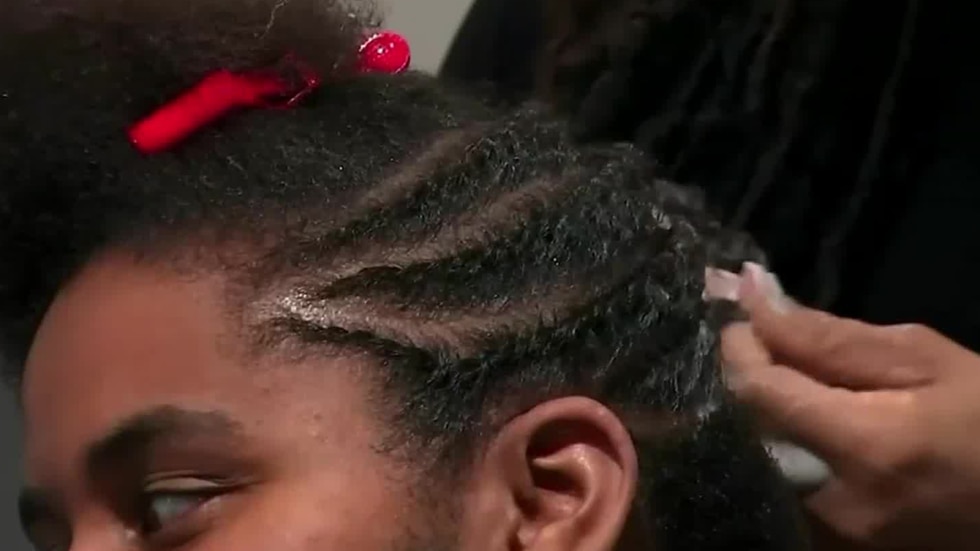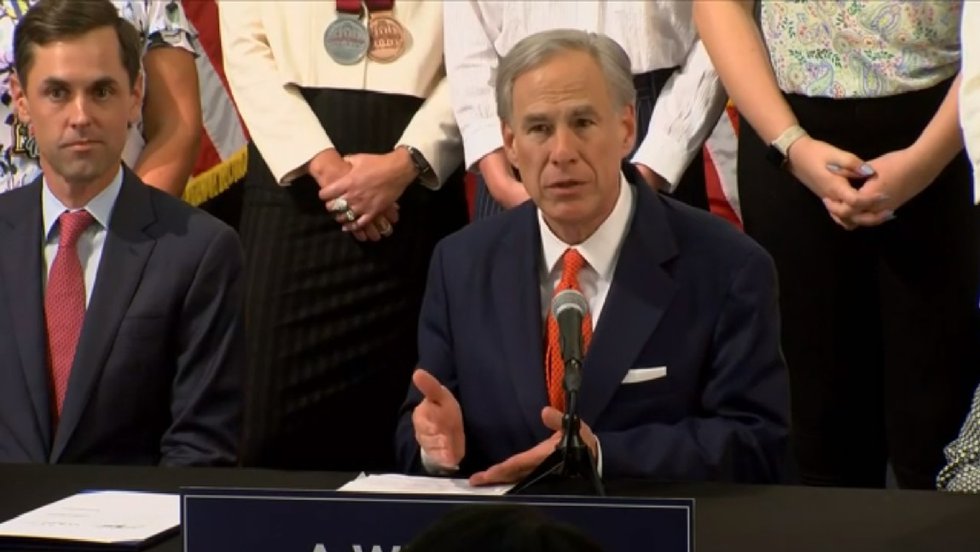WICHITA FALLS, Texas (KAUZ) – On Sept. 1, 2023, more than 700 laws signed by Governor Abbott earlier this year will take effect. Below are 10 of the most-talked-about bills Governor Abbott signed, briefly explaining why they’re relevant to you.
H.B. 393
The bill, also called Bentley’s Law, allows courts to order mandatory monthly restitution for children whose parents were victims of intoxicated manslaughter. With this law, the court will determine how much money a child under 18 is eligible for if a drunk driver killed their parent or guardian, including financial needs for a surviving parent or guardian if only one died. Those ordered to pay restitution and imprisoned for intoxicated manslaughter will begin paying their restitution no later than the first anniversary of their release.
According to Mothers Against Drunk Driving, the idea behind Bentley’s Law is to provide a sense of justice to victims and survivors and make sure offenders are reminded of the heartbreak they caused by choosing to drive impaired.
The law was created in Missouri in 2021 after a drunk driver killed a young boy’s parents and infant brother. Tennesee was the first state to pass the law, and Gov. Abbott signed the Texas version on June 2, 2023.
H.B. 567
This law is part of a national campaign to pass the CROWN Act to prevent discrimination based on protective hairstyles commonly or historically associated with a particular race. The law bans discrimination in student or employee dress and grooming policies based on the style or texture of someone’s hair. Public schools, universities, and employers can not ask people to change their hairstyle to a “more professional” manner if they wear a protective style such as Bantu knots, locks, or twists.
The campaign was established by Dove Beauty and the CROWN Coalition in 2019. A recent workplace study published by the CROWN Act revealed that Black women’s hairstyles are two and a half times more likely to be perceived as unprofessional. Additionally, Black women with curly or textured hair reported microaggressions at two times the rate of Black women with straight hair.

H.B. 2545
This law establishes guidelines direct-to-consumer genetic testing companies must follow concerning Texas consumers’ genetic data. According to the bill, “direct-to-consumer” means an entity that offers genetic testing products or services directly or collects, uses, or analyzes genetic data that results from a direct-to-consumer company or individual. The law grants individuals exclusive property rights over their genetic data. It maintains that any biological samples or genetic results must be “de-identified” so they cannot be associated with specific people.
Police have used genetic profiles to solve crimes for decades. In doing so, they take DNA from a crime scene and compare it to DNA in the U.S. government’s public database, the Combined DNA Index System (CODIS). However, according to a 2020 research paper published in the Annual Review of Genomics and Human Genetics, the CODIS database is limited by the genetic data it contains, which is, in turn, determined by state and federal laws that define inclusion for the database.
Recently, however, police have been using public and private genetic databases to help them solve crimes by comparing DNA found at crime scenes to genetic data contained in public or private databases outside of CODIS. For example, a 2022 New Jersey lawsuit against the New Jersey Department of Health et al. was filed because police used blood samples taken from newborns to develop probable cause and obtain an arrest warrant for someone suspected of committing a crime.
The DNA sample the police used was nine years old at the time, and the suit plaintiffs claimed the police circumvented its obligation to produce a warrant to obtain a DNA swab from the suspect. The plaintiffs claimed this constituted an illegal search, thus violating the Fourth Amendment.
S.B. 1361
This law criminalizes using deep fake video technology to depict real people performing sexual conduct that did not occur in reality. According to the bill, “deep fake” is a term applied to videos showing an action that did not happen in reality. Deep fakes are created to deceive viewers and may become more prevalent as artificial intelligence technology improves.
According to NPR, anyone can use A.I. technology to create deep fakes depicting anything, such as Donald Trump getting arrested or Pope Francis wearing a puffy coat.
Deep fakes are not limited to visual imagery, as technology that mimics people’s voices has also improved. According to Reuters, people have begun creating deep fakes related to the 2024 presidential election that depict Joe Biden or Hillary Clinton saying things they never said.
Often, however, deep fake technology is used to depict nonconsenting individuals in pornography by targeting celebrities or through revenge porn on private citizens.
S.B. 1403
This bill allows the state of Texas to enter into interstate compacts with nearby states to share intelligence and resources related to security along the Mexican border. Resources include building physical barriers along the border, surveillance systems, or sharing law enforcement resources. Under this bill, the governor can develop an interstate compact among interested states without congressional approval.
Governor Abbott held a press conference on Aug. 21, stating he is working with 14 other states under Operation Lone Star to secure the southern border. According to the Office of Governor Abbott, Operation Lone Star is a joint operation between the Texas DPS and the Texas National Guard to stop and prevent human trafficking and cartel activity at the border. Abbott’s office claims the Biden Administration’s “open border policies” have caused a humanitarian crisis at the Texas-Mexico border, endangering Texan lives.
However, according to ProPublica and the Texas Tribune, the Department of Justice is investigating Abbott’s border operations for civil rights violations. More than 100 civil rights groups, led by the ACLU, filed a Title VI complaint with the DOJ alleging that Operation Lone Star discriminated against individuals based on their presumed race or national origin.
In addition to the investigation into Operation Lone Star, the DOJ has sued Abbott for using buoys in the Rio Grande River to deter migrants from crossing the water. According to Texas Public Radio, the DOJ claims the buoys in the river threaten public safety, block the waterway, and violate treaties with Mexico.

S.B. 12
This bill regulates sexually oriented performances, prohibiting them from being viewed on public property or by any audience younger than 18. According to the bill, a “sexually-oriented performance” is a visual performance that features a nude performer, a performer who engages in sexual conduct or appeals to the prurient interest in sex. The bill’s definition of sexual conduct includes “exhibition of sexual gesticulations using accessories or prosthetics that exaggerate male or female sexual characteristics.”
The bill initially began to ban children from viewing drag performances. It explicitly defined a sexually oriented performance as one that includes “a male performer exhibiting as a female, or a female performer exhibiting as a male, who uses clothing, makeup, or other similar physical markers and who sings, lip syncs, dances, or otherwise performs before an audience.”
Texas S.B. 12 emulates Tennessee’s S.B. 3, the first law in the nation that attempted to ban drag performances of any kind, according to PBS. The Tennessee law prohibited “male or female impersonators.”
A federal Trump-appointed judge that struck down S.B. 3 ruled that sexually explicit speech receives constitutional protections under the First Amendment, whereas obscene speech does not. He distinguished between speech obscene in the vernacular and obscene under the law, meaning that speech that seems obscene to some people may still receive constitutional protection if it is not legally obscene.
The judge determined that S.B. 3 was constitutionally vague and overbroad because law enforcement could chill expressions unrelated to drag performances, characterizing them as “drag” through the law’s application.
Obscenity under First Amendment jurisprudence is determined by application of the Miller test, developed from the 1973 Supreme Court decision in Miller v. California. For speech to be considered obscene, it must meet all three criteria described in the Miller test, which was specifically designed to allow as much speech as possible under other First Amendment precedence.
S.B. 14
This bill bans gender-affirming care for minors in Texas. It prohibits surgical and medicinal treatment of gender dysphoria, except in precocious puberty cases or where a child is born with a “medically verifiable genetic disorder of sex development.” Therefore, Texas children can receive puberty blockers if they experience puberty too early in adolescence, and they can receive surgical care as a treatment for intersex genetic conditions.
According to the Human Rights Campaign, up to 45 percent of trans youth aged 13 to 17 live in states that have banned or are considering banning gender-affirming care. However, some states, including Texas, are considering bans for adults up to 26 years old.
According to an article published in the Harvard Law Review, gender-affirming care aims to treat gender dysphoria caused by a discrepancy between one’s sex assigned at birth and one’s internal gender identity.
Transgender healthcare is administered in conjunction with extensive counseling and therapy, and individuals usually begin their transition socially by changing their names, clothing styles, and hairstyles to present as their preferred gender socially.
S.B. 15
The Save Women’s Sports Act prohibits transgender women from competing on women’s collegiate athletic teams. Specifically, the bill bans the opposite sex from competing on college sports teams and men from competing in mixed-sex intercollegiate athletics. However, female athletes may compete on men’s teams if the institution has not established a corresponding women’s team. The law also specifies that a student’s biological sex is that which is stated on their birth certificate at birth and has only been corrected due to a clerical error.
According to the ACLU, excluding transgender women from athletics invites an opportunity to discriminate against cisgender women through gender policing involving invasive tests designed to determine if someone is “too masculine” to be a “real woman.”
Last August, a pair of Utah parents triggered an investigation into a female student they claimed was not feminine enough to compete on the girls’ team. The girl’s school investigated her enrollment records back to kindergarten and discovered she had always been female.
S.B. 15 and similar bills raise questions about enforcing transgender sports bans in athletic institutions.

S.B. 763
This bill allows schools “to employ or accept as volunteers chaplains for “support, services, and programs for students as assigned by the board of trustees of the district or the governing body of the school,” according to the bill. The law does not require chaplains to be certified by the State Board for Educator Certification. However, school counselors, librarians, and other student service specialists must have a Master’s degree and be approved by this board, per the TEA website.
The bill’s text categorizes chaplains similarly to school counselors, social workers, or other mental and behavioral health personnel, despite not having the same requirements from the State Board for Certification.
A letter from various Texas chaplains denounced the law, claiming it is an attempt by the Texas government to insert Christianity into public schools. The letter expresses concerns that the law does not bar chaplains from proselytizing while at schools. Additionally, it discusses the law’s disregard for the experience and training required to be a chaplain that a religious organization professionally recognizes.
H.B. 1181
This law criminalizes commercial entities, including social media platforms, that “knowingly and intentionally” publish or distribute sexually explicit material as more than one-third of their content on the Internet without age verification methods to ensure such material does not reach minor audiences. Under this law, commercial entities are expected to perform digital age verifications on the people who use their websites. Additionally, commercial entities must display a “sexual materials health warning” on the landing page of their site, warning people of the dangers of pornography.
A similar law passed in Virginia resulted in the adult-content website “Pornhub” disabling its services to users with Virginia IP addresses.
According to WRIC 8News, the Virginia General Assembly enacted an age verification in July 2023. Pornhub expressed concern over verifying users’ ages through digital verification, claiming that requiring users to submit identification every time they visit the site was an ineffective solution. Companies can choose whether to comply with the law without proper enforcement.
According to the Texas bill, companies that violate H.B. 1181 will incur a civil penalty of no more than $10,000 per day for not verifying users’ ages.
The Supreme Court previously ruled on restricting online content to protect minors from harmful media when it ruled in Reno v. the ACLU in 1997. The Communications Decency Act made it a crime for anyone to knowingly transmit offensive or indecent speech to a minor. The ruling declared the phrases “indecent” and “patently offensive” were vague and overbroad.
However, the Texas law differs from the CDA in that it does provide definitions and examples of material the law deems “patently offensive with respect to minors.” Though it is 26 years old, the Reno ruling questions the effectiveness of age verification when limiting minors’ access to explicit sexual content.
Curious about a law that we didn’t list? Visit the Texas Legislature’s website to view all laws coming into effect this September, and message us your questions on Facebook!
Copyright 2023 KAUZ. All rights reserved.







